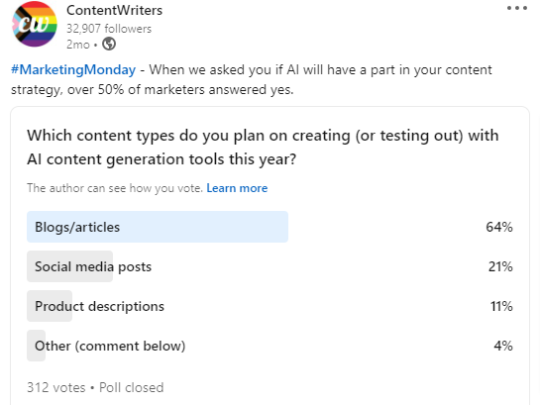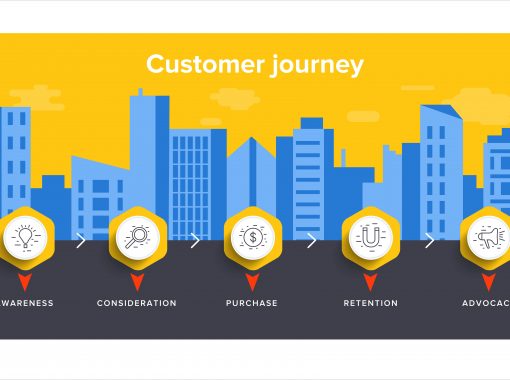
AI Content Marketing & Writing: Trends, Use Cases, & Limitations
In the world of content marketing, artificial intelligence (AI) has become a hot topic. As the CEO of ContentWriters, I’ve been closely following the evolution of AI in our industry.
We recently conducted a series of polls on LinkedIn that garnered 1,312 responses. These polls shed light on how professionals are incorporating AI into their content strategies.
One of the most significant shifts we’re seeing is the growing intersection between artificial intelligence (AI) and content marketing.
According to the polls conducted by ContentWriters:
- Over 50% of marketers indicated that AI would be part of their content strategy.
- 64% plan to use AI for blogs and articles, 21% for social media posts, 11% for product descriptions, and 4% for other types of content.


These figures underscore the growing importance of content marketing AI. However, it’s important to keep in mind that the adoption of artificial intelligence comes with a hefty share of considerations.
Use Cases of AI Content Marketing
First, let’s discuss some use cases for AI tools in content marketing.
Content marketing AI has immense potential, and our polls show that people are finding it useful at different stages of the content creation process.
- 31% found it most useful for ideation
- 40% for research
- 17% for writing
- 12% for optimization

According to our survey, many respondents find AI to be a useful tool in content creation, potentially due to the rise of AI tools like OpenAI’s GPT-4 that are aimed at enhancing this process. These tools can offer assistance in tasks such as keyword research, topic generation, and content optimization.
However, the effectiveness of these tools is not guaranteed and can vary based on the specific task, user needs, and broader content strategy. Essentially, while AI tools show potential in various use cases, they should be seen as another piece of the puzzle in content creation, offering support but not a standalone solution.
Drawbacks of AI Content Marketing Tools
While AI tools can aid content marketing, they have notable drawbacks that underscore the importance of human involvement.
Paraphrasing some of the comments from our LinkedIn polls series, our audience expressed concerns with:
- AI’s research capacity, with one respondent explaining that sometimes AI tools seem to just “make things up,” and asserting that it should be used only as a jumping off point.
- AI’s ability to appeal to human emotions and make a true human connection with readers, with one respondent even saying it produces “soul-less copy.”
- The originality of content produced by AI tools, with one respondent noting it often ends up producing content very similar to that of your competitors.
The shortcomings of AI content generation tools are especially pronounced when it comes to Google’s guidelines for Expertise, Experience, Authoritativeness, and Trustworthiness (E-E-A-T). These factors are critical for establishing credibility and trust with readers, and for maximizing organic search performance.
AI Content Generation Tools Can Produce Biased, Inaccurate Content
Despite their speed and efficiency, AI tools can only work with the data they are given. If the input data is biased, outdated, or incorrect, the output will reflect these flaws.
Companies in ‘Your Money or Your Life’ (YMYL) industries such as health or finance should take note of this. YMYL topics require a deep understanding of complex concepts, and associated content should be backed by reliable sources and analysis.
Relying solely on AI-generated content can be particularly risky in these areas. On the other hand, bylined and credentialed writers bring a level of authenticity, credibility, and expertise that businesses can capitalize on to connect with their audiences while sending EEAT signals to Google.
Skilled human writers have the ability to delve deep into subjects, conduct thorough research, and provide a level of analysis and interpretation that ensures accurate and trustworthy content.
AI Writing Doesn’t Display Emotional or Personalization
AI’s current capabilities limit its ability to generate content that truly resonates with readers on an emotional level. A human writer, for example, might weave a personal story into an article to create a strong connection with readers — something that AI tools cannot effectively replicate.
Human writers have the capacity to infuse content with their unique perspectives, experiences, and storytelling abilities, establishing a stronger emotional connection with readers. By incorporating personal anecdotes or real-life examples, human writers can engage readers on a deeper level, fostering trust and resonance.
Businesses can improve their content marketing strategies and develop deeper relationships with their target audience by taking advantage of the expertise, authenticity, and emotional connection provided by human writers.
Choosing the Right Approach for Your Business
As Google has noted, while using AI in content creation isn’t inherently “wrong,” the focus should always be on quality and EEAT. In other words, whether you’re using AI, human writers, or a combination of the two, the goal remains the same: to create content that provides genuine value to your audience.
Your marketing objectives and the requirements of your target audience should guide the decision to include AI in your content strategy.
Consider the type of content you’re creating. Templated content may benefit from the speed and efficiency of AI, though it still may require a human touch for nuance, accuracy, and authenticity. However, legal advice, medical content, and financial articles may carry too high a risk to rely heavily on AI content generation tools.
If you move forward with AI generation tools in your content strategy, remember that these tools are not a replacement for human creativity and expertise. While AI may be able to provide a helpful starting point or assist with repetitive tasks, it’s crucial to have a human editor or writer review and refine the content, personalizing it and smoothing it over for brand voice and tone.
Lastly, take ethical considerations into account if you’re using AI for content creation. Review your content to ensure it’s not perpetuating any harmful stereotypes or biases, and to make sure it accurately reflects your brand’s values.
Looking Ahead: Content Marketing AI and the Future
We’re excited about the possibilities generated by AI content marketing, but we’re also aware that it’s not a silver bullet. One thing remains clear: The value of human insight, creativity, and expertise is irreplaceable.
As content creators, marketers, and strategists, our task is to navigate this dynamic landscape and harness the power of AI while upholding the values of quality, authenticity, and trust that define our work.
To learn more about the evolving intersection of AI and content marketing, explore our blog or reach out to our team at ContentWriters. We’re here to help you explore the ever-changing world of content marketing, one word at a time.




